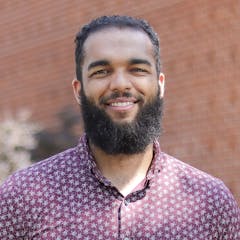Kids Without Car Seats
How My Newborn Exposes Our Nation

Mariella Elizabeth Morse — her name will forever be engraved upon my heart. Waiting anxiously for her arrival welded my heart to hers. First holding her nine-pound frame was indescribable as it was unforgettable. Life as it was before is no more. Now I am a father. She has been born.
Sleepless months (that feel like years) have passed. Lessons of my heavenly Father to his son are still being learned. The petals of a new mother’s love toward her daughter are still blooming before my eyes. God has given my wife and me a baby girl.
Different Side of an Anniversary
The new addition to my family makes this year’s anniversary of Roe v. Wade feel different. Now I am visited with even deeper sadness, even greater anger, even deeper desperation for the church to stand fast and for Christ to return soon. I used to contemplate abortion as a man holding his Bible. Now I do so as a man who’s also holding his daughter.
The connection between the high court’s ruling and my newborn first crawled into my mind from the strangest of all places: the strict regulations for newborns in car seats. If we didn’t have a car seat, and that properly installed, the powers that be would not let us drive from the hospital with our baby girl. We had ours installed by certified personnel.
“We know babies are going to the slaughter for our sexual freedom.”
We’ve come a long way, as the older generation reminds me, from dad driving off with mom holding the newborn in one hand and a cigarette in the other. A change for the better, to be sure. We have certainly progressed in securing our children’s safety in their earliest stages of life — at least in some ways. Lethal inconsistencies still exist in the land of the free and the home of the brave.
Different Sides of the River
“Why are you killing me for your own benefit? I am unarmed.”
“Why, do you not live on the other side of the water? My friend, if you lived on this side, I should be a murderer, but since you live on the other side, I am a brave man and it is right.”
I recently read this dialogue between a soldier and an unarmed man in Blaise Pascal’s Pensees. He ponders how killing a man from one side of a river (the man’s homeland) is murder, while killing a man on the other (an enemy country during wartime) is heroic. Being born on the right side of the river, in Pascal’s critique of the arbitrariness of human justice apart from God, bestows an unarmed man his rights. “It is a funny sort of justice,” he later remarks, “whose limits are marked by a river; true on one side. . . false on the other.”
My point is not to fill the gaps left in Pensees, or to debate pacifism and just-war theory, but to redirect Pascal’s musing to imagine the following conversation — not between a soldier and his unarmed enemy, but between a man and his unborn child.
“Why are you killing me for your own benefit? I am unarmed.”
“Why, do you not live on the other side of the birth canal? My child, if you lived on this side, I should be a murderer, but since you live on the other side, I am a brave man and it is right.”
In America, rights are bestowed to those currently living on “the right side” of the canal. On one side, he or she is a child with a God-given “inalienable right to life, liberty, and the pursuit of happiness.” On the other, a baby can have the most fundamental of these — the right to life — if he or she is wanted.
Different Sides of the Street
Sometimes a road becomes that river between the right to life and sudden death. When my daughter was born, a Planned Parenthood clinic stood just across the highway. For the majority of my wife’s pregnancy, I had the legal option to exit to the left or to the right into either parking lot. The life of our child held in the balance of a turn signal.
On the one side of the street, a doctor could legally have “terminated the pregnancy” as a servant of the people, a warrior for women’s rights. If he did so in the hospital across the way, he is a murderer and a villain. On one side, he would receive jail time. On the other, government funding. It is a strange form of justice when such a boundary is marked by a road, true on one side, not on the other.
“Lethal inconsistencies still exist in the land of the free and the home of the brave.”
But God’s law is not based on caprice or contradiction. In God’s justice, if a man strikes a pregnant woman, and her child dies, the man pays with his life — “life for life, eye for eye, tooth for tooth, hand for hand, foot for foot, burn for burn, wound for wound, stripe for stripe” (Exodus 21:22–25). In the justice of modern man, he may go to jail for striking a pregnant woman and killing her baby — unless she hired the man, in the assembly line of an abortion clinic.
Different Sides of Sanity
This brings me back to car seats.
How do we reconcile laws forbidding a baby from leaving a hospital seated improperly — we wouldn’t want them to get injured — with the fact that in the same country, with the same legislators, ruling the same people, we have other laws that call the fatal injuring of the unborn, millions upon millions, legal.
Do we see no inconsistency between militantly taking her from a mother’s lap on the ride home (in the name of safety) and condoning (even promoting) the fatal removal, sucking, and yanking of the unwanted child from the womb? It is unreasonable and unsafe, we conclude, to allow a baby to move more than two inches in her car seat. Yet it is reasonable, we also conclude, to impede a baby from moving the four inches down the birth canal by issue of a death sentence. “If you choose to keep her, you had better protect her!” — if you choose to keep her.
Different Sides of Our Eyelids
Now this anniversary feels different for me. Thousands of unborn boys and girls will not live to see the outside world. And girls, like my little daughter, are aborted at even higher rates because they are girls. They will never grow up to laugh until they cry, feel nervous as they attend their first day of school, process down the aisle in marriage, or far more importantly: hear the great news of Jesus Christ or live for his glory in this world.
“I used to contemplate abortion as a man holding his Bible. Now I do so as a man who’s also holding his daughter.”
What Moses accomplished with a staff (Exodus 7:17), and the sorcerers of Egypt with their dark magic, our Supreme Court did with a single verdict in 1973. We too, have filled our lands with blood. And yet, somehow, we go about our days, weeks, and years without relatively little acknowledgment of the fact. We all know they are killing children. We know they’re spilling the blood of those who can’t fight back. We know babies are going to the slaughter for our sexual freedom. We cannot say, “Behold we did not know this” (Proverbs 24:11–12). God knows we know — we cannot hide behind eyelids as if this holocaust were not happening (Leviticus 20:4–5).
Here on this tragic anniversary, let’s renew our prayers for the United States (and for the one-third of the world’s nations that have legalized abortion on request), for legislators, for the women who are tempted towards an abortion, and those fathers tempted to flee responsibility. Let’s cry for mercy for those who participate, that they might repent and find forgiveness in Christ. And let’s speak with clarity and courage. Let’s relentlessly call abortion what it is: a flourishing industry, and the not-so-secret practice of killing the unarmed on the wrong side of the river.




